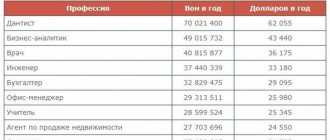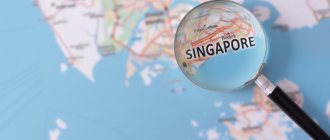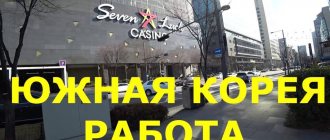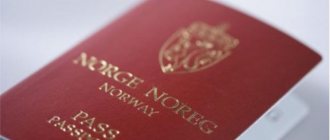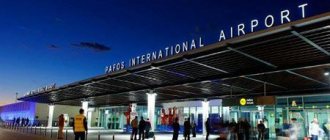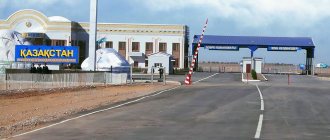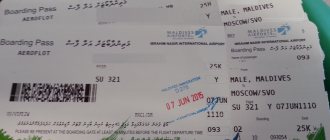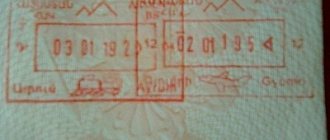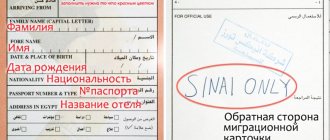Geography, economy and resources of the country
South Korea is also called the Republic of Korea. It occupies the southern part of the Korean Peninsula, namely 45%. The population is about 51 million people.
The official language in the country is Korean, and the capital is Seoul. In the north, South Korea borders on China and the Russian Federation. The territory is washed by the Sea of Japan and the Yellow Sea. Coastal waters are optimal for fishing, so you can enjoy a large variety of exotic fish in Korea.
Most of the land is occupied by hills and mountains. There are many hotels on the coast, and there is also a developed infrastructure for tourists.
Agriculture is poorly developed due to the soil being of granite or gneiss origin. Therefore, artificial soils are used for planting different crops. Korea has reserves of brown coal, iron, gold, graphite, salt and silver.
The climate in the country is monsoonal and continental, so in January the average temperature is -3.5 degrees.
The Republic of Korea is a democratic state whose residents are endowed with sovereign rights. Back in 1948, the Constitution was adopted, which is regularly amended. The country is divided into 9 separate provinces, as well as 7 cities, which have provincial administrative rights.
Study in South Korea for foreigners
Citizens of different countries go to study in South Korea. These are mainly students seeking higher education. It is highly valued in South Korea. After graduating from university, a young specialist is guaranteed to get a prestigious, well-paid job. And not only in Korea.
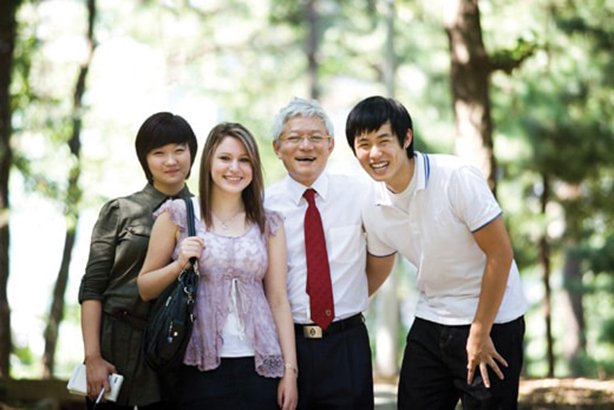
International students in South Korea enjoy studying
There is a difference between studying at a college and studying at a university, which is equivalent to higher education. In the first case, these are mainly vocational institutions that train specialists for agriculture, shipping, art, etc. for 3–4 years.
Studying at the university consists of three stages:
- Bachelor's degree (3–4 years);
- master's degree (2–4 years);
- Doctoral studies (up to 4 years).
Foreigners who have studied at a university in their country for at least one year are allowed to receive higher education in South Korea. Universities train specialists in a wide range of fields.
Table: visa types depending on the type of study
| Type of employment | Visa |
| Education in colleges and state universities. | D-4 |
| Training for further work in companies with South Korean investments. | D-4–2 |
| Studying at private universities | D-4–6 |
| Learning and improving the Korean language | D-4–1 |
| Learning and improving foreign languages | D-4–7 |
Documents for student visa
Standard set of documents for obtaining a visa to study in South Korea:
- Application completed personally by the applicant.
- Color photograph 3.5x4.5 cm.
- International passport with a validity period of at least one year.
- Birth certificate for applicants under the age of majority.
- Resume (brief CV), letters of recommendation, motivation letter.
- Certificate confirming knowledge of Korean or English.
- An invitation from the university or another similar document.
- Certificate from a medical institution regarding your health status. Testing for tuberculosis is mandatory.
- Certificate of no criminal record.
- Confirmation of payment for visa processing.
- Confirmation of tuition payment.
Photo gallery: best universities in South Korea
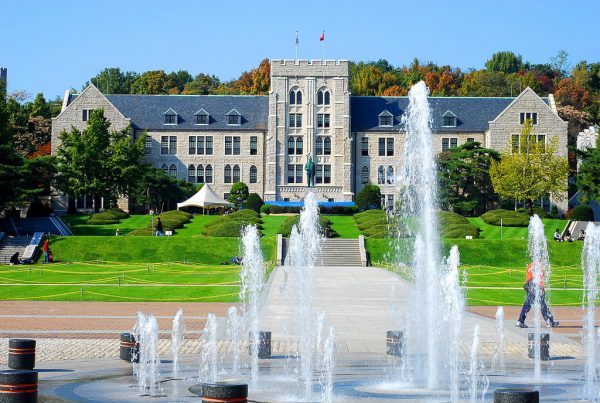
Korea University is a prestigious private university
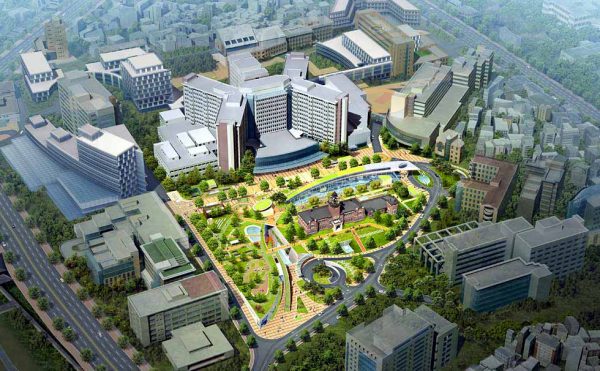
Seoul National University became the first institution of higher education on the entire Korean Peninsula
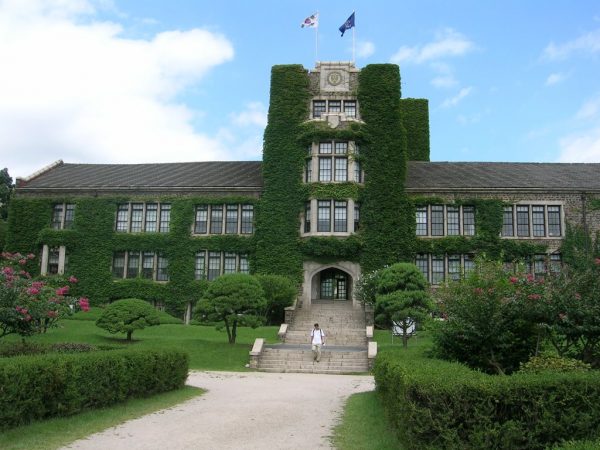
Yonsei University is a private university founded through missionary activities
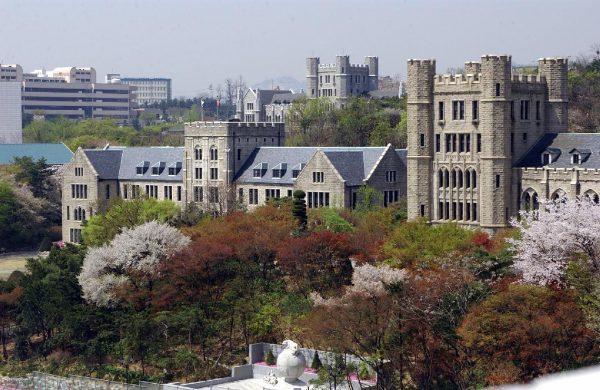
Pohang University of Science and Technology was founded in 1986 as the first science-oriented university in South Korea
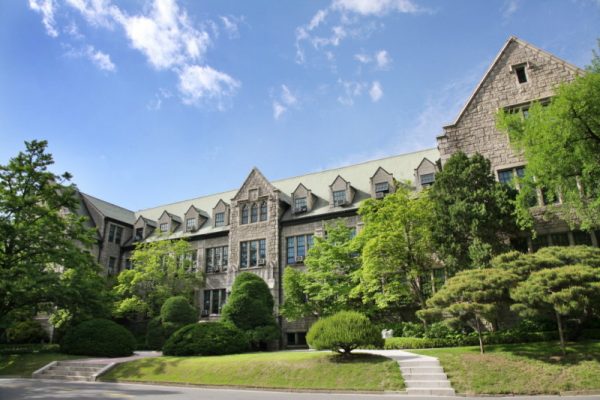
Ewha Womans University is the world's largest women's university
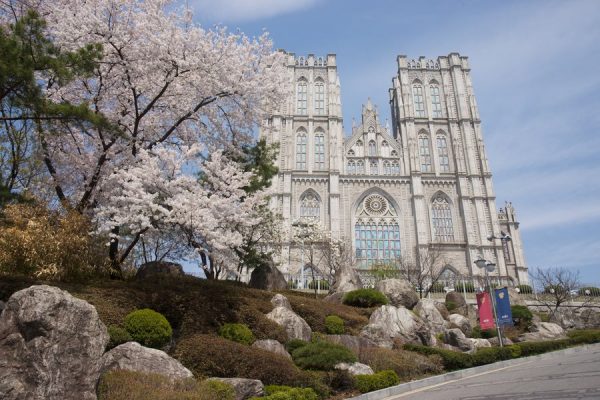
Kunming University provides internship opportunities for students abroad
Population, culture, mentality
If a Russian citizen decides to move to Korea for work and permanent residence, then he must have a good understanding of the mentality and culture of the local residents. Only in this case can difficulties in finding employment be avoided. What a migrant needs to know:
- many foreigners live in Korea, including Ukrainians, Russians and residents of Kazakhstan and Tajikistan;
- local residents are polite and smiling, they perceive age in a special way, since the counting of years in the country begins from the moment of conception, not birth;
- a strict hierarchy is formed in relationships, so younger people cannot call older people by name;
- Confucianism greatly influenced the life of Koreans, so all people strive for order;
- parents want to give their children the best education, so Koreans do not spare money for these purposes;
- Marriage is an important event, so Koreans usually prefer to start a family at a later age;
- the boss at work is always right, so he cannot be refused, and every foreigner planning to officially get a job in Korea should remember this.
You should come to Seoul or another city in Korea only after studying the traditions and characteristics of the local residents. It is advisable to have a good knowledge of the Korean language and culture of the population.
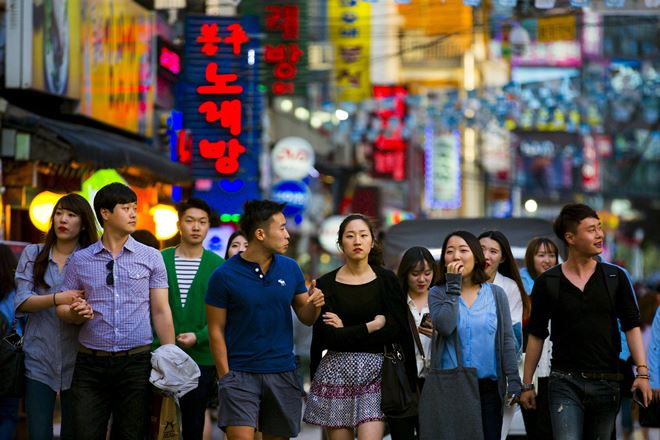
Types of work visas to South Korea
There are a huge number of visas to enter the Republic of Korea. Which visa you need to get depends on the duration of the trip and the purpose of your stay in the country. For all types of visas the following documents are required:
- Embassy application form;
- Color photograph 3.5 x 4.5 cm on a gray background;
- A copy of a foreign passport, the validity of which does not expire during the validity of the visa;
- An invitation from an employer or an internship;
- A copy of the contract signed by the employer;
- Consular fee, the amount of which also depends on the type of visa and is about 100 US dollars.
Work visas
Here is a list of some of the most popular and sought after visas.
C-4 , up to 90 days - this type of visa is issued for a short period of time to highly skilled or short-term workers. It requires, in addition to the standard set of documents, a copy of the official certificate established by the laws of Korea, which indicates the registration of the Korean company - the employer.
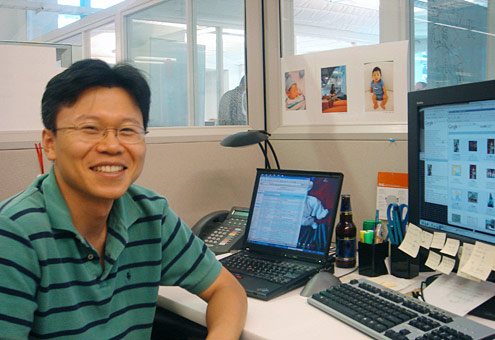
For teachers or artists planning to tour the country, additional recommendations from the Korea Media Rating Board are needed. This is the official ethics censorship organization. It determines the age limit of spectators for viewing concerts and other public performances, lectures, etc. Permission from the Ministry of Culture of South Korea and other additional certificates and documents may also be required.
E-1 , up to a year - only highly qualified specialists - teachers - can apply for this visa. In addition to the standard package of documents, you will need a work history translated into English or Korean, a copy of the contract with the employing company, as well as a document confirming your academic degree, if any.
E-2 , for a period of up to a year - this visa is given only to foreign teachers teaching spoken language. And in addition to a copy of the contract and recommendations, additional documents are needed, such as permission from the Ministry of Justice of the Republic of Korea, a certificate of no criminal record, a medical record and a copy of a higher education diploma, translated into Korean and certified by a notary.
E-3 , up to a year - this visa is usually called a “research” visa. It is issued based on the results of completed
![]()
grants only to high professionals. To receive it, you also need confirmation from the Ministry of Justice of Korea, official registration of the company paying the grant, and a contract concluded with it. A translated biography and documents confirming higher education and academic degree are required.
E-4 , valid for up to a year - issued to specialists who plan to provide technical supervision. A special feature of this visa is that the set of documents includes an agreement or certificate that states the import of foreign technology. And from the specialist who will provide technical guidance in the implementation of this technology or training in its use, we need either a contract with the employer or a document confirming a foreign business trip from the company that sold this know-how. If the purchasing company is involved in defense activities, this must also be indicated.
E-5 , valid for up to a year , is a very popular type of visa. No special or special documents are required beyond the standard ones to obtain it. Most specialists who come to the country to work for up to a year and have a higher specialized education receive exactly this.
E-6 , for a period of six months - this visa is issued to specialists in creative professions who come to the country on tour. These could be circus performers, dancers, or female models. Features include permission from the Ministry of Culture, a performance plan presented according to the sample, a portfolio and a certificate from a modeling agency or a document confirming graduation from a specialized modeling school. Of course, all documents must be translated into Korean and certified by a notary.
E-7 , for up to a year. Typically, this visa is issued if the work and purpose of a long visit to the country does not satisfy other types of visas. In addition to the standard package of documents, special documents may be required, the type of which depends on the specifics of the activity.
Visa for ethnic Koreans
The country has a special type of visa - F-4. This visa is only issued to ethnic Koreans living outside the country. It’s not easy to get one if you’re not Korean. To obtain it, you must prove your ethnicity to the Korean people.
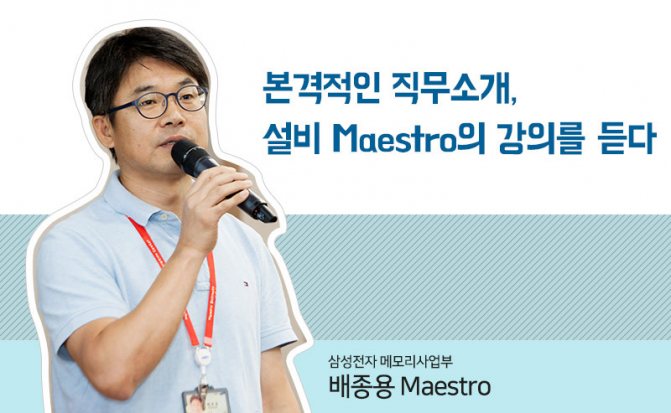
However, the lucky ones who receive it can study and work in the country without restrictions in any field of activity. In addition, it is issued for up to two years and can be extended without leaving the country, and after five years, apply for Korean citizenship.
You can obtain it by preparing the following set of documents:
- Documents confirming ethnic Korean roots up to the third generation. Those. Both children and grandchildren of emigrants who left Korea before its division into North and South can come to the country. To do this, you will need a set of birth, marriage or death certificates of Korean relatives, which can be used to trace kinship.
- Certificate of medical examination confirming the absence of tuberculosis and other contagious and intractable diseases.
- In addition to a foreign passport valid for the duration of the visa, you also need a copy of your Russian passport.
- Completed application form in Korean.
- Color photographs taken on a gray background, standard size.
- Consular fee, which is 120 US dollars.
Please note that an invitation from an employer is not required to obtain this visa.
Business – immigration to South Korea
Another type of visa that does not require an official invitation from an employer is this visa for wealthy foreigners - D-8. To do this, you need to contribute at least one hundred thousand US dollars to the country's economy.
This visa is called an “investment” visa and is issued for a period of one year. But it is not difficult to extend it. You don't even have to leave the country to do this. Here is a list of documents for obtaining an initial visa of this type:
- A copy of the international passport.
- A special application form filled out in Korean or English.
- Standard photos for a Korean visa. They must be colored, 3.5 x 4.5 cm in size, but on a gray background.
- Application from an investor entering the country.
- Certificate of the company in which the investment will go.
- Travel documents from this company.
- If a foreigner is the owner of a foreign company, then a certificate of registration of this company in Korea.
- Both of these businesses must have a registration period of at least two weeks.
Cost of living and unemployment
Korea has its own currency, it is called the won. 1 won is equal to approximately 5 rubles. The minimum salary in the country is 1 million 573 thousand won per month, which is equal to about 85 thousand rubles. This indicator is recalculated annually by order of the Ministry of Labor. This salary is usually offered to people who work in the service sector, for example, this is what hostesses or general workers receive. Citizens with any specific skills can count on higher salaries. These include programmers or teachers.
Local residents immediately after completing their studies strive to get a job in large corporations, where salaries start at 2.5 million won. The job search process begins in the 4th year of study. The companies themselves publish information about what kind of specialists they require.
Salaries in South Korea can vary significantly from company to company. Russian workers who do not have good knowledge of the Korean language receive the minimum wage, and they are also offered the simplest jobs. But if a Russian, Kazakh or other foreign citizen is invited to work by a large company, then he is offered favorable conditions and a good income.
Although employers offer an 8-hour workday, Koreans actually work much longer, as they are constantly delayed. An increase in earnings is possible after passing a qualifying exam, and you also need to work in the same company for at least three years. Vacation lasts a maximum of 10 days, so people try to go on vacation on different national holidays. The standard of living for Russians is quite high. If a person comes from Russia for permanent residence in South Korea, then you need to prepare for the following expenses:
- rental housing per month in the capital of the state will be about 38 thousand rubles;
- if you rent a room in a hostel, it will cost approximately 12 thousand rubles;
- the difficulty of renting an apartment lies in the need to make a large deposit, which is about 500 thousand rubles, so such expenses can be afforded by families or people who already have a good income;
- bus fares vary from 1300 to 2400 won (from 70 to 130 rubles);
- a one-time trip on the subway costs 1,250 won (68 rubles);
- medicine is paid, so you have to take out insurance, which covers up to 75% of the cost of treatment, and the cost of insurance for foreigners depends on their monthly income;
- in Korea, mobile communication and Internet services are quite expensive, so about 2.3 thousand rubles are spent monthly on these purposes;
- in Korea there is a cult of food, so local residents never skip meals, and the basis of their diet is rice and various additives from vegetables or meat;
- the price of products is low, and in each store you can issue a discount card, which allows you to significantly reduce the cost of purchases;
- It is more profitable to go to the market for groceries, where you can buy various ripe vegetables and fruits at affordable prices during the season; fishermen also offer local fish there.
Last year the unemployment rate was 4.2%, which is considered quite high. The number of unemployed people per year amounted to 134 thousand people. This deplorable state of the economy is due to the consequences of the global crisis. The increase in unemployment has led to a decrease in confidence in the president. But even in such an economic climate, any resident of Eurasia can find the best job for themselves in Korea.
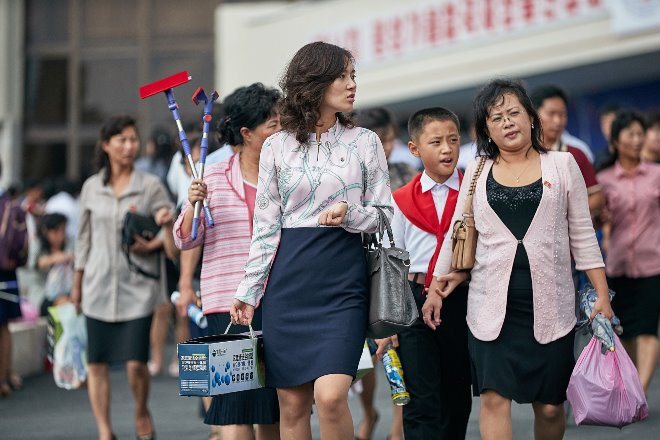
What is attractive about working in South Korea?
Why do labor migrants from Russia turn their attention to this Asian country? The fact is that South Korea is on the list of world leaders in the production of cars and mobile phones, as well as information technology. At the same time, its economy is developing at a rapid pace, annually showing even higher values of its main indicators.
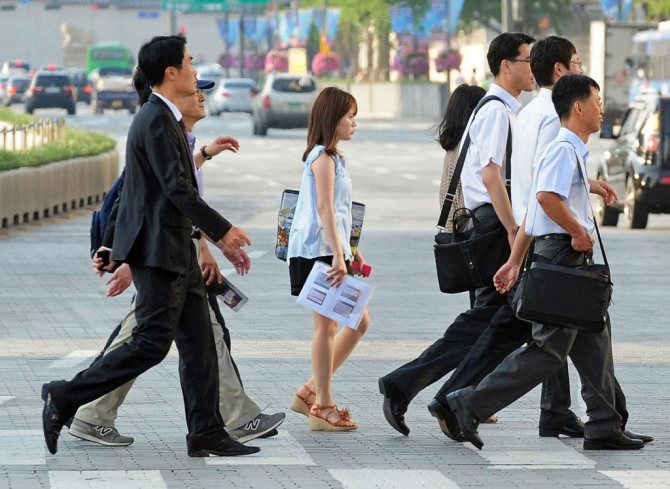
According to available data, the flow of immigrants to South Korea is constantly increasing. At the same time, many foreigners are ready not only to work in this country, but also to live in it.
Another advantage of working in South Korea is the absence of negative attitudes towards visitors. Managers of enterprises and firms put foreign specialists on the same level as their own.
Anyone looking for a country for labor migration should keep in mind that South Korea is one of the few countries where there are many vacancies in the manufacturing sector. This is explained quite simply. The fact is that there are quite a large number of factories located on the territory of this Asian country. These industries are constantly in need of labor. The suburbs of Seoul, as well as Gyeonggi Province, are especially popular among labor migrants. This is where the largest number of job vacancies are offered.
Popular professions and salaries
It is difficult for foreigners to find a highly paid job, as they need to have different knowledge, skills and work experience. There are many applicants applying for good positions. Employers often choose local residents who are willing to work longer hours without additional pay. Therefore, residents of the CIS are often forced to take less attractive jobs. If a foreigner does not have a good education, he will be able to work as a cook, laborer or salesman. Some Russians come from Vladivostok to work as shift workers, which allows them to earn large sums of money. Women are often employed as governesses or saleswomen. There are many jobs available for men in factories or construction sites.
Work in Korea for citizens of Russia, Kyrgyzstan, Kyrgyzstan or Armenia may be different. The amount of earnings depends on the skills you have. There are several professions that are popular among residents of Russia, Uzbekistan and other CIS countries:
| Profession | average salary |
| Leadership positions | 390 thousand rubles. |
| Plastic surgeons | 275 thousand rubles. |
| Lawyers | 250 thousand rubles. |
| Doctors | from 170 to 220 thousand rubles. |
| Builders | 190 thousand rubles. |
| Workers in factories | 170 thousand rubles. |
| Governesses and teachers | 150 thousand rubles. |
| Vendors and hostesses | from 90 to 110 thousand rubles. |
Some companies offer a minimum salary of 85 thousand rubles.
The official working week is 40 hours, and people have to work from 8 to 19 hours every day. Many companies use a staggered schedule and employees have to stay late all the time.
Salaries are calculated based on the number of hours worked. If a person works in a factory at night, he receives an increased amount of pay. The minimum wage for one hour is 414 rubles. Usually the working day begins at 8 or 9 am, but specialists from the port or agricultural enterprises are forced to arrive much earlier.
Russian Representative Offices in South Korea
Address: 119121, Moscow, Plyushchikha st., 56, art. 1.
Telephone (visa questions), 7 495 783 27 47 (consular questions).
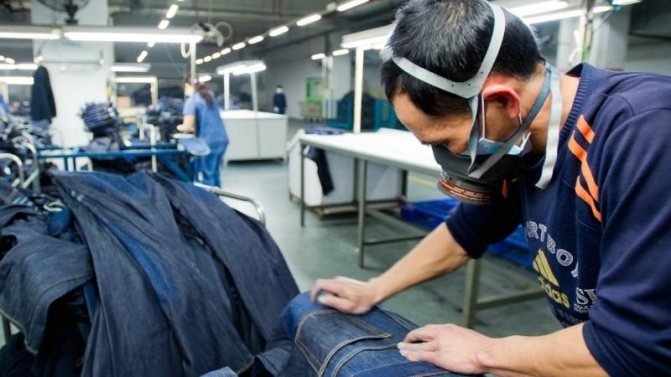
Fax machine.
Official website: https://overseas.mofa.go.kr/ru-ru/index.do
Opening hours: Mon-Fri 9.00-12.30, 14.00-18.00.
Address: 690091, Vladivostok, st. Pologaya, 19.

Telephone.
Fax machine.
Address: 04516, Seoul, Jung-gu,11-gil, Seosomun-ro, 43.
Phone: 82 2 318 21 16, 82 2 318 21 17, 82 2 318 21 18.
Fax: 82 2 754 04 17.
Search for vacancies and working conditions for local residents and foreigners
Working conditions for foreigners differ significantly from the conditions in which local residents have to work. Foreigners coming from Moscow, Khabarovsk or Ulan-Ude usually do not have good knowledge of the Korean language or specific skills. Therefore, they can count on simple and uncomplicated types of income. They often work on a rotational basis or in seasonal jobs. Their salaries are usually lower than those of local residents, but they are rarely called upon to work overtime.
There are different ways to find work in South Korea. The following methods are used for this:
- Independent search. You can even find different vacancies in numerous Korean companies on your own. To do this, you only need to have a good knowledge of the Korean language to study the content of local sites created to search for vacancies.
- Using an intermediary. To do this, you need to contact specialized companies offering job search services. They provide foreigners with various vacancies in Korea, after first assessing the client’s knowledge and skills. Such services are paid.
- Through the labor exchange. If a person plans to not only work, but also live in South Korea, then he can apply for a visa and residence permit in advance. Additionally, he can obtain citizenship in various ways. Under such conditions, work in South Korea may be provided by the labor exchange. To do this, you just need to contact this organization with an application and educational documents. Specialists will be able to find the optimal place for employment in a short time.
Each method has both pros and cons. There is a lot of work in Korea for Russians, but there is no need to settle for the first job that comes your way, since if you have unique knowledge you can count on high salaries and good working conditions.
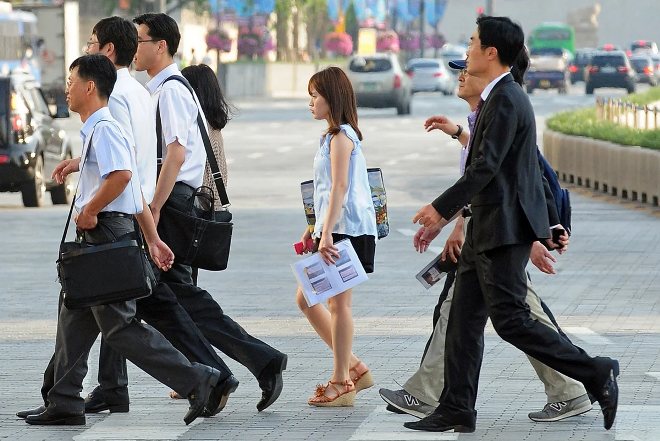
Immigration to South Korea for Russians
South Korea is washed by the Sea of Japan. In the north it borders with the DPRK. The country is characterized by mountainous terrain, and the higher the mountains, the colder the climate. In the south of the republic, in the region of the island of Jeju, the climate is closer to temperate subtropical, and in most of the country it has a monsoon subtype.
There are 49 million people living in the country. 95% of the population are Koreans. The largest minority in the country are Chinese. One part of the population is Christians, the other is Buddhists. The economy is largely based on manufacturing, particularly the production of machinery. The service sector is also well developed. Marine, mountain and cultural-historical tourism is actively developing.
The citizenship law in South Korea was issued in 1997 and remains relevant to this day. There are several grounds for obtaining citizenship: by birth, by descent and through naturalization. The latter is divided into categories that include recognition and general naturalization.
Dual citizenship is not allowed in the country. Upon reaching 22 years of age, a citizen must determine which of the two citizenships he wants to retain. You can voluntarily renounce citizenship. To do this you need to contact the embassy. There are also factors that regulate its involuntary loss. Thus, a person receives the citizenship of a foreign spouse or parents. Involuntary loss - divorce from a Korean citizen if the second person was not a local citizen. This also applies to the case when a Korean has not formalized a renunciation of second citizenship within six months.
Since April 2014, a visa-free regime has been in effect between Korea and the Russian Federation, which makes it possible to stay on the territory of the republic for 60 days without issuing special permits and having only a foreign passport. Immigration to Korea is a rather complicated process, since the legislation of this country in this regard is quite complex. There are several options to immigrate to the country.
Employment
The Korean authorities are interested in the influx of highly qualified personnel, so you can immigrate here on the basis of professional migration. The candidate will need to enter into an employment contract with a Korean company and find employment in compliance with all legal rules. In the future, the applicant may be able to obtain citizenship.
The employer must submit a package of documents, their copies and certificates for the employee. Initially, a foreigner receives a residence permit for a year with the possibility of extension. Over time, it will be possible to obtain permanent residence. This type of immigration allows you to become a citizen in the future, both for yourself and for family members. If we are talking about high-ranking specialists, they can obtain permanent residence immediately.
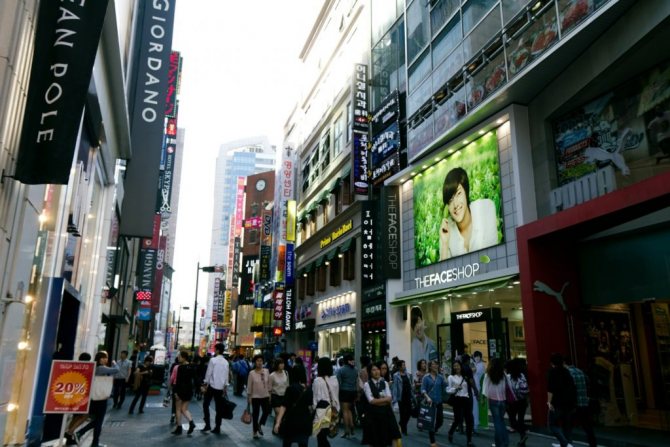
Programmers, designers, engineers, and specialists in the field of science and biotechnology are especially in demand in South Korea. It is worth considering that when hiring local residents will be a priority, therefore it is important to agree on the contract and the candidacy of a foreign citizen with the Ministry of Labor. To do this, the organization will have to prove that it has not found a suitable citizen.
An application for permanent residence can be submitted after three years. It is not necessary to maintain this period in the case of executives and managers of large international companies.
Business immigration and investment
Moving to South Korea with further acquisition of citizenship is possible for investors. To obtain permanent residence, you need to invest at least 500 million Korean won (500 thousand US dollars) in the country's economy. If we are talking about pensioners, this amount is 300 million.
In addition, a residence permit is issued to entrepreneurs who open a business on the company’s territory. But it is not enough for a businessman to simply open an enterprise - he must necessarily prove the seriousness of his intentions, his solvency and solvency. To do this, first of all, it is necessary to provide the authorized agency with a detailed business plan for future activities. A bank account statement may also be required. If the content of the project is approved by the Ministry of Economy, the candidate will be provided with a long-term visa with the opportunity to obtain a residence permit.
Education
To obtain a residence permit, students must provide a contract with an educational institution, which will detail the curriculum, study time and cost. A student residence permit allows you to study and work part-time at the same time: 20 hours during study, and 40 hours during the holidays.
Purchase of real estate
Buying real estate is equivalent to investing. If the purchased home costs more than 500 million won, it will be considered an investment and will provide an opportunity to immediately obtain permanent residence. At a lower cost, you will not automatically receive citizenship, but the purchase will be an advantage when applying for it.
Family reunion and marriage
Another way to immigrate to South Korea from Russia is family reunification. This procedure is suitable for those who have close relatives in the country. A citizen is required to reside in the republic for five years. First you need to submit an application to the migration service. The guest will be checked for criminal records and financial well-being, and the success of emigration will depend on the results.
The guest will receive a visa valid for one year. In the future, it can be extended for 2 years, and after that it will be possible to make a permanent place of residence. If a minor receives the invitation, the child must be accompanied by two parents. You can limit yourself to one parent, but this will alert the migration services, which will conduct additional checks and find out why the second person legally represents him.
There is another, fairly simple way for Russian citizens to obtain South Korean citizenship - marriage with a national of the country. This is a good way for girls, since many Koreans are not averse to marrying Russian women. Having married a citizen of the country, after three years you can obtain a residence permit. Couples must confirm that the marriage is not fictitious, and it will be possible to extend permanent residence or obtain a passport through simplified naturalization. Please note that only official marriage is recognized in South Korea. If you registered it in another country, you will need its legalization here.
Ethnic immigration
The program for ethnic Koreans is aimed at returning native citizens to their homeland. It was introduced in 2005. A foreigner is issued an H-4 visa, which makes it possible to obtain citizenship according to a simple scheme. In this case, proof of ethnicity will be required. You will also need to pass a Korean language proficiency exam. You will be issued a residence permit for 5 years. At the same time, the document will allow you to stay outside Korea for no more than three months a year. But after five years, an ethnic Korean will be able to obtain citizenship without applying for permanent residence.
Immigration for refugees
To obtain refugee status, you will have to prove that you cannot return to your homeland due to persecution that threatens your life.
There are other, less common methods of immigration. These include undergoing long-term medical treatment in the country, participating in research or volunteer programs.
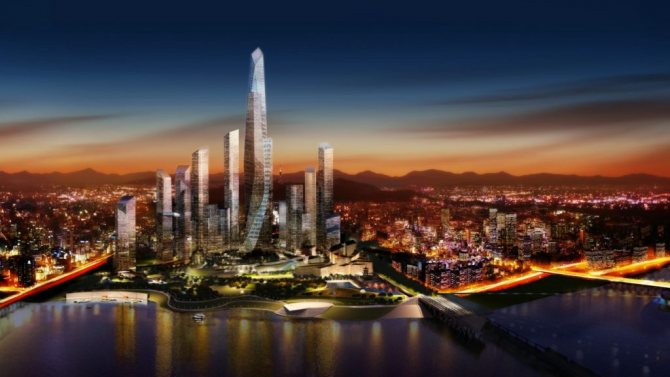
Vacancies for citizens of the Russian Federation, Ukraine and Kazakhstan
There are many reviews from Russians on the Internet about working in South Korea. Not all of them are positive, since often Russians and Ukrainians, even with good education and experience, cannot find high-paying jobs. The list of vacancies for foreigners is limited. You can only count on better and more acceptable conditions by obtaining citizenship or through a good education. The search can be carried out independently or through an intermediary. The following vacancies are most often offered to Russian-speaking workers:
- hostesses serving customers in restaurants or hotels;
- work on a rotational basis in factories or factories, construction sites or other enterprises;
- general workers, usually required during the construction of various objects;
- taxi drivers;
- specialists working on cruise ships, and they can work as cooks, cleaners or security guards;
- watchmen who take care of the protection of various enterprises or warehouses;
- agricultural workers involved in planting, harvesting or other similar activities;
- employees for textile production.
Even if a foreigner does not have knowledge of the Korean language, he must be able to communicate at least in English. Otherwise, it is impossible to build a dialogue with the employer or clients. Many companies offer flexible work schedules and night shifts.
Salaries and vacancies in South Korea
South Korea has a very strong economy, and this is due not only to the development and implementation of modern technologies in the industrial sector; the service sector is not lagging behind. In addition, the country is home to a large number of international companies that employ foreigners.
The average salary in South Korea in 2021 is about 4,003,3 thousand Korean won per month ($3.5 thousand). The official minimum wage for a Korean worker in 2021 is 8,720 won per hour ($7.7).
Jobs in South Korea for Russians in 2021 are available in the automotive industry, IT, shipbuilding, electronics manufacturing, mobile communications, finance and some other industries.
Salaries here range from 2.5-3.5 thousand dollars per month and above. There is work in South Korea for those with unskilled professions, for example, for attractive girls, there are vacancies for models and dancers; hostesses are very popular in Korea.
Translators, English teachers, builders, workers for farms or seafood processing workshops are often required. Pay in these areas is quite varied, from 600-700 dollars monthly . Much depends on the region; in Seoul you can earn much more than in other Korean cities, but the competition here is much higher.
Employment in South Korea for Russians, Ukrainians and citizens of other CIS countries
If residents of Dushanbe or any Russian cities decide to go to Korea to obtain citizenship and employment, then they must be well versed in the working conditions. Often, employment requires nostrification of educational documents or an internship. Additionally, you should understand the rules of business immigration. More details:
- Business immigration is when a foreigner plans to open a business in Korea. To do this, you need to get a D-8 visa, which costs about 100 thousand dollars. This is exactly the amount of funds required to contribute to the Korean economy. If you apply for a visa for the first time, it will be valid for one year. Afterwards it will be possible to extend it without leaving the country. Therefore, if a person plans to do business in South Korea, then he needs to have large capital in order to be able to obtain permits. If you do not have knowledge of the Korean language, you will additionally have to hire a translator to compile the questionnaire.
- Internship. It is the most optimal way to study the ethnic center of South Korea and the Korean language. The internship can be done at different factories or offices. Additionally, a Russian, Kyrgyz or other foreigner will be able to gain work experience in this state, so in the future there will be no difficulties in obtaining another place of employment. In Russia there are many different companies that implement educational projects, on the basis of which Russians can go to Korea for an internship and subsequent registration of citizenship. You can get an internship by participating in student competitions. You can take advantage of international programs that involve student exchange between different universities.
- Nostrification of documents. Educational documents obtained in Russia or another CIS country are most often accepted by Korean employers. But in most cases, nostrification is required, for which you need to use the services of special companies and translators.
Reviews about working in South Korea are not only positive, but also negative. Disadvantages usually include low earnings compared to local residents, as well as a different mentality.
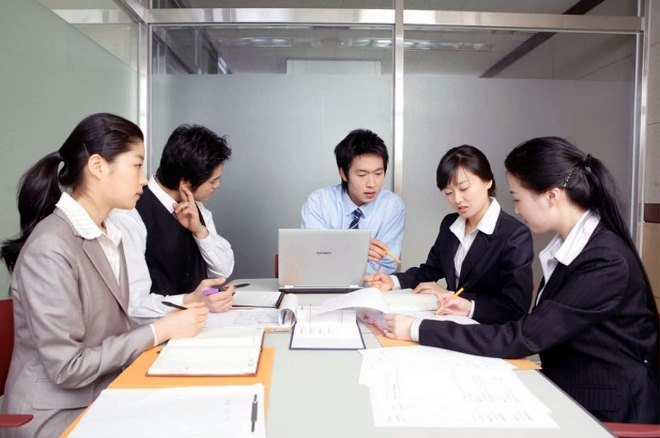
How to find a job in South Korea: reviews from foreigners
The specificity of employment of Russians and CIS citizens in South Korea is that most migrants manage to realize themselves as a seasonal worker, unskilled worker or highly qualified specialist. On the website of the Consular Service of the Embassy of the Republic of Korea there is eloquent information: “Citizens of the CIS are not issued a work visa!!!” But then there is an addition: in addition to ethnic Koreans and highly qualified specialists. In addition, many of the migrants use the opportunity to stay visa-free in South Korea for two months to look for temporary or seasonal work.
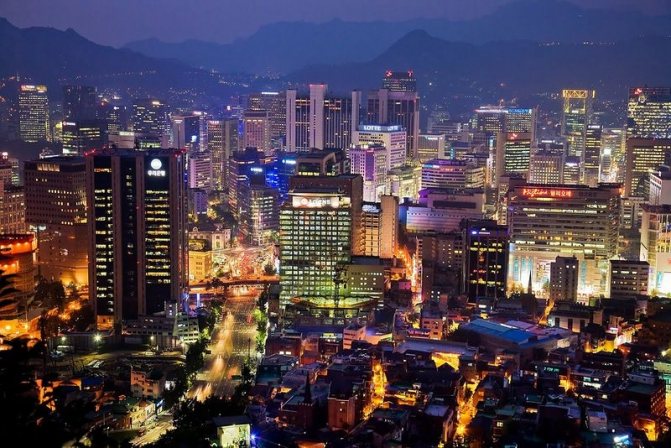
The largest number of job offers is always in the capital - Seoul
Ways to find a job
The most convenient way to look for work in South Korea is via the Internet. You can get detailed information about available vacancies and working conditions on specialized websites, among which the most popular are:
- www.koreajoblink.com;
- www.footprintsrecruiting.com;
- www.southkoreajobs.com;
- www.4icj.com/kr;
- www.hanlist.com;
- jobs.asiabot.com;
- www.koreajob.ru.
In addition, information about available vacancies can be obtained from local media, most of which have an electronic version. Many of our compatriots who are looking for work in South Korea turn for help to specialized agencies, whose offices are located not only in the capital, but also in the Far East, for example, in Nakhodka and Vladivostok. The services of such organizations are quite expensive, but as a result, the applicant gets the opportunity to avoid many difficulties at the initial stage of settling in a foreign country. Another way to search is to directly contact the employer’s office or register on the company’s website: using this option, you can get acquainted with the working conditions in the workplace first-hand and leave your resume.
Professions in demand in South Korea in 2021
It is quite difficult for a foreigner to get a well-paid job in South Korea (if the migrant is not an ethnic Korean). To qualify for a prestigious vacancy, you need to be head and shoulders above your Korean competitor in terms of professionalism. As of 2021, there is a certain shortage of the following specialists in the country:
- radio engineer;
- constructor;
- IT specialist;
- technologist;
- scientist in the field of applied sciences;
- specialist in physics and chemistry.
In addition, workers with higher technical education are in demand. Highly qualified financiers, programmers and engineers with knowledge of English and Korean have a good chance of finding a job in their specialty. Migrants without special education have the opportunity to get a job in factories and furniture manufacturing plants, agricultural farms, seafood processing plants, clothing manufacturing, etc.
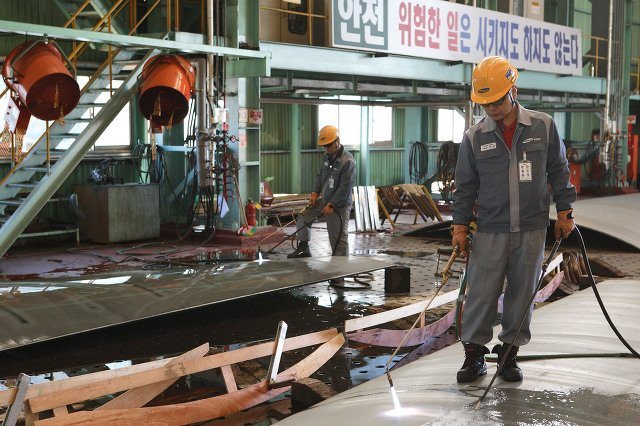
Workers with higher technical education are in demand in the country
Common vacancies and salaries
Among the most common vacancies offered by recruitment agencies in 2021:
- printing house employee;
- worker at an auto parts plant;
- electric substation worker;
- worker at a metal fabrication plant;
- employee of a metal laser cutting company;
- restaurant staff;
- aged care worker;
- hotel and hotel staff;
- food sales manager;
- specialist at a factory for the production of telephone batteries;
- worker at a meat processing plant;
- employee at a shipbuilding enterprise;
- textile packer;
- personnel at a fish processing plant;
- highly qualified turner;
- farm worker;
- sailor.
Those of our fellow citizens who decide to come to South Korea without a work visa (which is possible, but only for 60 days) will most likely be forced to find work on the so-called “arbeit”. For some reason, this word of German origin has taken root in Korea and means low-paid work that does not require qualifications, or simply a laborer. An employee with this status usually lives in housing provided by the employer and goes every day to a site that requires labor. At the same time, the type of work can change daily: most often it is harvesting, auxiliary work in the kitchen of a restaurant, a laborer in a factory, a loader in a warehouse, etc. The wages for such workers usually do not exceed 60–120 thousand won ($50–$100) per day, despite the fact that the working day can last 10 hours or more.
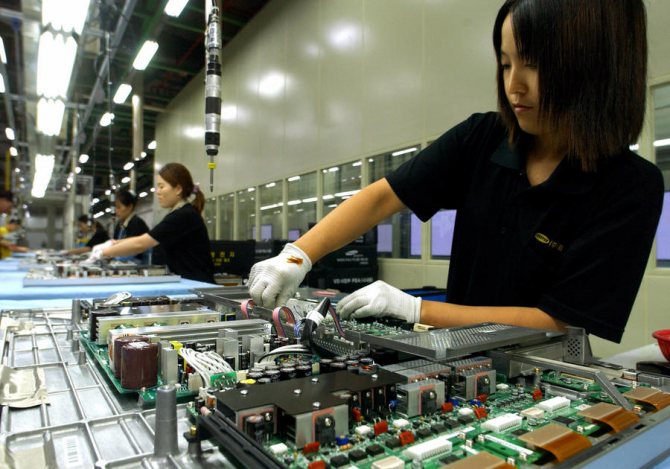
Among the most common vacancies in Korea is an employee of an electronic equipment production plant.
Salary and working hours
The salary depends on the qualifications of the employee and the market demand for this profession. Officially, the average salary in the country is $3 thousand, but this figure is more than arbitrary, since there is a large disparity in wages depending on the region of the country, the nationality of the employee and even gender: women receive $100–200 less, than men. After paying all taxes, a Korean worker receives an average of $17 thousand per year. The minimum wage in the country is approx. $1015 or $700 after taxes. The total amount of deductions from wages is about 26%.
Table: salaries in South Korea
| Profession | Salary, $ per month |
| Dentist | 3400 |
| Surgeon | 3700 |
| Plastic surgeon | 4000–4200 |
| Lawyer, advocate, notary | from 4000 |
| Top manager | 5000–6000 |
Video: how much you can earn in Korea
Officially, the working week in South Korea since July 2018 is 40 hours (i.e. 5 days of 8 hours) of regular time + 12 hours of overtime, but studies conducted by various statistical agencies show that one should work 35 hours a week instead of 40 .
Knowledge of Korean and English is a prerequisite for employment of highly qualified specialists.
The work is different. For example, packing boxes - although it does not require much physical effort, it is nevertheless monotonous and after a month or two of daily 10-12 hour exercises, you just need to go crazy. But this is a low-paid job and mainly for women. Men try to get a job in construction - they pay much more, but you also have to work like an ox, literally and figuratively. Money is not spent there, but accumulated. After working for a year at a construction site, receiving 1200–1300 dollars a month, and sometimes even more, you could bring 12–15 thousand dollars home.
Tarakot
https://forums.drom.ru/vladivostok/t1152220426.html

Doctor is one of the highest paid professions in the country
Applying for a work visa: procedure
To legally get a job in a Korean company, you need to apply for a work visa before traveling. For this purpose, the requirements of Korean legislation are taken into account. There are 12 different visas available in the country, two of which are intended for Koreans living in other countries.
The basis for obtaining a visa is an official contract drawn up with the company where you plan to conduct work. The procedure for obtaining a document can be completed independently; to do this, you should contact the Korean Embassy in Russia, or you can use the services of agencies.
If you plan to obtain a permit yourself, then follow these steps:
- First you need to contact the diplomatic mission located in Moscow, so if a Russian lives in another city, he will have to come to the capital.
- Then a package of documents is prepared, which includes an application on the form of representation, a passport, educational documents, a resume, a certificate confirming that the person has found work in Korea, photographs, a receipt for payment of the registration fee, as well as a medical certificate.
- Additionally, a certificate is required confirming that the person is not under investigation and has no criminal record.
If you use the help of an agent, you will have to pay for his services. It is important to contact trusted specialists so as not to stumble upon scammers.
Types of work visas
Even a pensioner has the opportunity to get a job or move to South Korea. If you plan to find official employment, you need to find a house or apartment to live in, and also apply for a visa. There are several visas that differ in validity period, price and other parameters.
| Work visa type | Its purpose and features |
| S-1 | Used by journalists for temporary activities in their specialty. |
| S-2 | Used by Russians who come to Korea on a business trip for a short period of time. |
| S-4 | It is intended for highly qualified specialists, but is short-term, therefore it is issued for a maximum of 90 days. |
| E-1 | It is a teaching permit valid for one year, therefore it is chosen by teachers and lecturers planning to move to a new country. |
| E-2 | Issued to conversation teachers, valid for a maximum of 1 year. |
| E-3 | Intended only for scientists or researchers who have a grant, the visa is valid for a year. |
| E-4 | Used only by technical managers who are involved in the introduction of foreign technologies into the work of Korean organizations, issued for only one year. |
| E-5 | A professional permit valid for up to one year, and this visa is the most popular among Russians and residents of other countries. |
| E-6 | Represented by a commercial visa, which is issued to artists for six months. |
| E-7 | Used for special types of activities, valid for a maximum of one year. |
| F-4 | Intended exclusively for ethnic Koreans. |
| N-2 | Visitor visa issued to ethnic Koreans for 5 years. |
The specific type of visa chosen depends on the person's education, skills, and place of employment. Advice: before moving, it is better to decide in advance on the field of activity and the company, and also resolve the issue of housing. This will help you quickly settle into a new place.
Requirements for applicants
The visa is only issued to foreigners who meet the requirements. These include:
- availability of a place of employment, which must be confirmed by official documents received from the Korean employer;
- absence of any infectious diseases;
- availability of the optimal amount of funds to pay for housing and food in the new country;
- no criminal record;
- knowledge of English or Korean;
- sometimes – having a higher education, thanks to which a person can get a job in any district of the country.
Sometimes compliance with other conditions may be required; you need to find out about them directly at the consulate. You need to apply for a visa only after an organization in Korea has been found in which the person plans to work. The employer sends an invitation and documents to the company. They are the basis for obtaining a visa.
Documents for obtaining a visa
To apply for a visa you need to prepare the following documentation:
- a foreign passport, and it must be valid for the entire period for which the permit is issued;
- application form, the form of which can be obtained from the consulate;
- two photographs measuring 35x45 mm;
- invitation from the employer;
- work permit;
- educational documents;
- a copy of the employment contract;
- certification number assigned by the Korean Migration Service based on documents received from the employer;
- a receipt for payment of the fee, which ranges from $80 to $120;
- medical certificate.
You need to look for a job before directly applying for a work permit. A visa is issued within 30 days after submitting the papers.

Where to apply
You can get a visa in different ways. To do this, you can contact the South Korean consulate in Russia in person, submit documents by mail or online by contacting the migration service directly. But this method is suitable for applying for an E-5 visa.
When using the Internet, you will have to send scans of all documents and receipts for payment of the fee.
Rules for filling out the form
When using any method of obtaining a visa, you will have to fill out the application form correctly. The filling rules include:
- one document is drawn up in English, and the other is filled out in Korean, so sometimes a translator will be needed;
- the applicant's full name, gender, date of birth, nationality, home address and telephone number are indicated;
- information from the international passport and the chosen place of employment are provided;
- marital status and information about children and spouses are recorded;
- the purpose of the trip and the period for which the applicant plans to stay in Korea are indicated;
- the address of the house or apartment in Korea where the foreigner will live is given;
- previous trips to this country are described;
- lists other states that were visited by the citizen within 5 years.
If the trip is paid for by a sponsor, then his details, degree of relationship and other information are indicated. At the end, the form is signed and dated.
The people in Korea are friendly and calm, so moving rarely brings negative emotions.
Possible reasons for refusal
Direct travel to Korea is only possible with a visa. It is the work permit that serves as the basis for migration, but any Russian may face a refusal to receive this document. This is usually due to the following reasons:
- lack of necessary documents;
- the presence of errors in the application or other papers;
- providing false data;
- violation of the visa regime during previous trips.
If the violation is eliminated, you can resubmit the documents, again paying the consular fee.
Procedure for official employment in South Korea
South Korea's immigration policy is regulated by laws on the employment of foreigners, including ethnic Koreans. Responsibility for the implementation of immigration policy lies with the country's Migration Service, which is one of the parts of the Ministry of Justice. Of the 32 types of visas provided for by Korean law, 12 are classified as work visas.
Work visa to the Republic of Korea
Only ethnic Koreans (category F-4), highly skilled professionals or short-term workers (category C-4) can obtain a work visa to Korea. In this case, you must submit:
- completed application form;
- 1 color photograph 3.5x4.5 cm;
- certification number.
The visa fee, ranging from $80 to $120, is payable in cash only.
Table: types of work visas and documents required to obtain them
| Visa type | Period | Required documents |
| C-4, short-term | 90 days |
For models:
For tours:
For teachers:
|
| E-1, teaching | 1 year |
|
| E-2, conversation teacher | 1 year |
|
| E-3, research | 1 year |
|
| E-4 Technical Manual | 1 year |
|
| E-5, professional working | 1 year |
|
| E-6, Commercial in the Arts | 6 months |
For dancers and circus performers:
For models:
|
| E-7, special activities | 1 year |
|
| H-2, visitor work visa for ethnic Koreans | 5 years |
|
Requirements for an applicant for a work visa and application procedure
The basis for starting the procedure for obtaining a work visa is, as a rule, an invitation to work from a company registered in South Korea. The applicant can submit documents to one of the branches of the Consular Service of the Republic of Korea in the Russian Federation personally or through third parties without a power of attorney. Documents sent by mail are not accepted. The period for reviewing submitted documents is up to 7 days. Among the mandatory requirements for an applicant for a work visa is passing a test for the absence of tuberculosis. You can take the test only in one of the certified clinics, a full list of which is listed on the website of the Embassy of the Republic of Korea rus-moscow.mofa.go.kr. The validity of the passport must expire no earlier than the planned departure from the country. The employee does not have the right to change the employer who prepared the visa documents. In case of dismissal, you must leave the country within 1 month, as the visa will be cancelled.
Video: work visa to Korea
Work permit in South Korea
Before applying for a work visa, the applicant must obtain permission to work in the country. Such permission is issued by the Government of the country, documents for receipt are submitted by the employer. To obtain a work permit you must submit:
- copy of the international passport;
- applicant's resume;
- copies of diplomas and certificates in English.
In addition, additional documents may be required depending on the location of work. It takes from 2 weeks to 2 months to review the documents, after which the employer sends a copy of the permit to the applicant for the job.
If the applicant plans to stay in the country for more than 90 days, he will need an ID card - a foreigner registration card. Such a card can be obtained at the immigration center at the place of residence, and the applicant will be required to:
- undergo a medical examination at one of the specialized clinics cooperating with the immigration center;
- undergo basic 3-hour training at the “Center for Assistance to Foreign Citizens” www.socinet.go.kr.
Next you need to submit to the immigration service:
- certificate of completion of a medical examination;
- a certificate from the “Center for Assistance to Foreigners” confirming completion of basic training;
- 2 color photographs 3.5x4.5 cm;
- international passport;
- completed application form;
- a copy of the rental agreement;
- the amount to pay the registration fee in the amount of 30 thousand won ($26).
As a rule, it takes about 2 weeks to review documents for obtaining an ID card - during this time the migrant can already begin performing official duties at the place of work.
Employment procedure for foreigners
If a Russian plans to move to Korea, then he needs to find a place of employment before applying for a visa. The process is divided into the following stages:
- Initially, a job search will be carried out, which can be done independently or through an agency.
- A place for temporary residence is selected.
- A potential employer evaluates the applicant's education and skills.
- A job invitation is sent.
- An employment agreement is drawn up.
- A visa is issued that allows you to come to Korea.
- Plane tickets are being booked.
- An ID card is issued after arriving in Korea.
After this, you need to come to the company to study the working conditions. Remember that foreigners must only work legally, otherwise they will be forcibly deported.
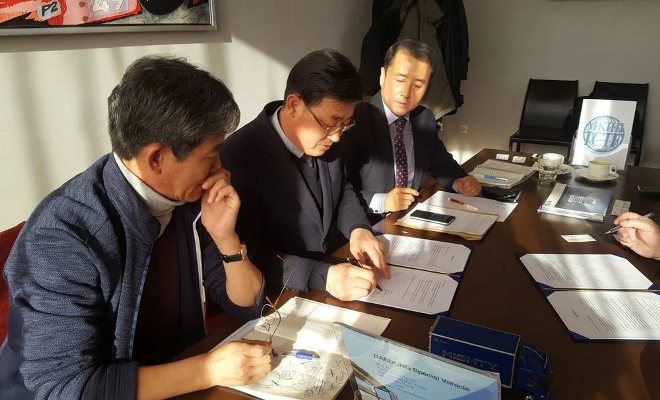
Requirements for job applicants
To legally work for a Korean company, you need to meet the requirements. Reviews from Russians who work in Korea indicate the need for the following skills:
- knowledge of Korean or English;
- presence of higher education;
- availability of a visa and place to stay;
- Good skills such as punctuality, responsibility, the ability to work overtime and a serious approach to work.
Each company may have different requirements, so you need to find out about them directly when communicating with a company representative.
Required list of documents
Before drawing up an employment contract, the applicant must submit a certain package of documents to the potential employer. It includes the following papers:
- copy of visa and passport;
- educational documents translated into Korean;
- work book containing information about past places of employment;
- summary;
- a questionnaire filled out according to the company form;
- medical certificate confirming the absence of dangerous diseases.
Additionally, other documents may be required.
Registration procedure, terms and payment
The registration process involves drawing up a formal employment contract in Korean. Before signing this document, you should study all the points. The duration of the contract depends on the validity of the visa. If necessary, the agreement is extended.
Pay depends on the number of hours worked. The minimum wage for 1 hour of work is 7,530 won, which is equal to 414 rubles. The working day lasts about 8 hours, and for overtime work 622 rubles are paid per hour.
If a Russian works on weekends or holidays, then the pay per hour of work increases to 820 rubles. Salaries are not issued in cash, so funds are transferred to a card, which can be issued at a Korean bank even without a visa.
Features of work in South Korea:
§ Work overtime is paid additionally.
§ On average, a working day lasts 10 hours a day.
§ The schedule at some enterprises may be flexible.
§ Night shifts are possible.
§ There are no fixed days off.
As for wages, at first it will be minimal - about $600 per month, but over time this figure will increase. Jobs in low-skilled fields can pay up to $1,000 a month.
Women, on average, have lower earnings than men:
§ Women – 660-700 dollars.
§ Men – 750-800 dollars.
Quite often, the employer provides its visiting employees with housing and food. Of course, you shouldn’t count on luxurious conditions, however, a portable house or container (trailer) with a refrigerator, washing machine and wi-fi is also quite good.
For visitors who have a higher education, an opportunity for career growth opens up directly in the capital itself, where the income level is an order of magnitude higher than in the suburbs. In Seoul you can get a job as a programmer, engineer, biologist or chemist. In this case, you definitely need to have a master's degree.
See also: Work in the USA for Russians vacancies 2021 without knowledge of the language with housing
Employment of married couples
Many Korean company owners invite married couples to work. This usually refers to labor on farms. The spouses' responsibilities include performing various simple tasks, such as tying knots, sowing or harvesting crops, growing seaweed, or raising buoys.
There are strict requirements for applicants, and there are also restrictions on the age of employees. Weekends are only offered during periods of high wind or rain. Families not only receive work, but also free room and board.
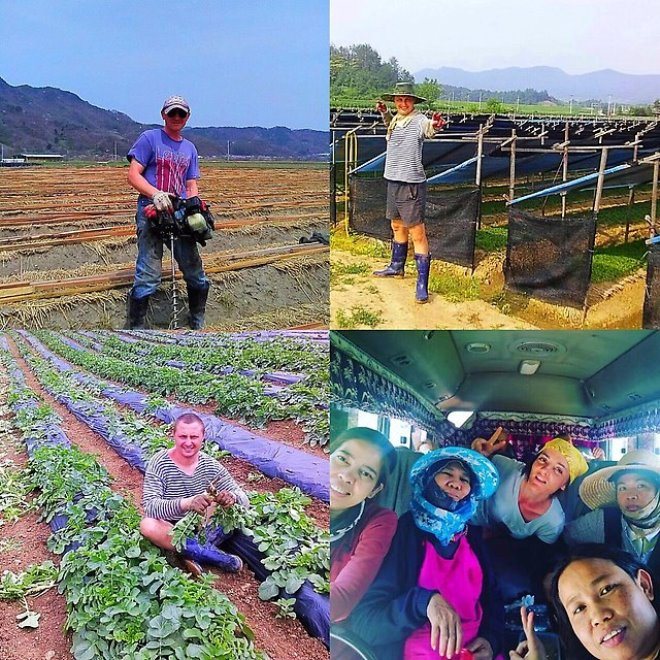
Pros of working in Korea: reviews from those who left
There are many reviews from Russians about working in Korea. With their help, you can understand how difficult or easy it is to work in this country. We can highlight both the pros and cons of moving to South Korea to conduct work:
| Advantages | Flaws |
| The low unemployment rate makes it possible for even foreigners to find good jobs | Koreans have priority in employment |
| There is no negative attitude towards foreign workers | Foreign workers must know English or Korean |
| Salaries are quite high, and this especially applies to highly qualified specialists | High competition |
| Low taxes | Requires a variety of unique skills and knowledge |
| Opportunity to work using unique, cutting-edge technologies | Difficulty and high cost of obtaining a visa |
| After 5 years of work you can get a residence permit | Significant working hours |
| Mild climate | Russians are provided with not very well-paid and interesting jobs |
Each foreigner must independently decide whether to move to South Korea to build a career. To do this, you need to focus on your skills, abilities and preferences.
South Korea is considered an attractive country for many foreigners. To work in this country, you need to find the optimal place of employment and obtain a work visa.
Features of job search in South Korea for Russian vacancies 2021
- It’s better to fly to South Korea as a tourist, get to know the Korean capital, communicate with the Russian-speaking population, listen to their reviews about life and work in the city.
- South Korea has a fairly high level of competition in the labor market. People come here from all over the world, and experience and qualifications are decisive.
- The city is home to the main offices of large global corporations - Kia, Hyundai, Samsung, etc., which always need qualified workers, including foreigners.
- To get a good job with a normal salary, you need to know English. Additional knowledge of Korean is also a big plus for your resume. Without knowledge of the language you should not count on a well-paid job.
- It is better to send your resume to potential employers directly, without third parties. Intermediaries may turn out to be scammers. You can also contact a professional recruitment agency, preferably South Korean or international. There are agencies on the territory of the Russian Federation in Nakhodka and Vladivostok.
- Those who decide to come to South Korea not on a work visa can get an “arbeit”, that is, hard work that pays below average. These are usually places for handymen.
- While searching for vacancies on the Internet, you can place an ad like “looking for a job in South Korea,” attach a resume to it, and monitor visits to the page.
See also: Holidays in 2021 holidays calendar
